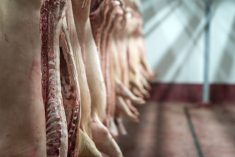Chicago | Reuters — Chicago Mercantile Exchange live cattle futures fell on Friday on profit-taking, a session after prices reached multi-week highs, brokers said.
The market was due to pull back after climbing six per cent since dropping on May 31 to their lowest price since October, brokers said. Strong demand from packers for a limited supply of cattle supported the gains, along with firm cash prices this week, analysts said.
The U.S. Department of Agriculture, in a monthly report, raised its projection for domestic beef production due to higher expected slaughtering that more than offsets lighter carcass weights.
Read Also

U.S. grains: CBOT soybeans, corn, wheat fall in USDA data aftermath
Chicago grains took a dive on Friday, following a closely watched U.S. government crop report and the release of export data that could provide clues into Chinese buying.
Packers slaughtered an estimated 124,000 head of cattle on Friday, up four per cent from a year ago, USDA said separately.
Strong demand from processors means there is no backlog of cattle waiting to be slaughtered, said Dennis Smith, commodity broker for Archer Financial Services.
“The packer is not cherry picking the show list and just being really choosy,” Smith said.
CME June live cattle ended down 0.85 cent at 136.2 cents. The most-active August contact dropped one cent to 136.2 cents, after jumping on Thursday to its highest price since April 27.
CME August feeder cattle slid 1.55 cents, to 174.475 cents/lb., a day after the contract touched its highest price since May 4.
In the pork market, most-active July lean hog futures rose 0.475 cent to close at 105.475 cents/lb.
Smithfield Foods, the world’s largest pork processor, said it will close a Vernon, California, plant and reduce its hog herd in the western United States. The closure comes as California rolls out a new law, Proposition 12, that requires livestock be given more spacious confinements.
“I think it’s a threat right now,” Smith said of Smithfield’s decision. “I think they will follow through on the threat if it looks like this Prop 12 is going into place.”
— Tom Polansek reports on agriculture and ag commodities for Reuters from Chicago.













